人教精通版英语六年级下册知识点汇总
- 格式:docx
- 大小:27.07 KB
- 文档页数:6
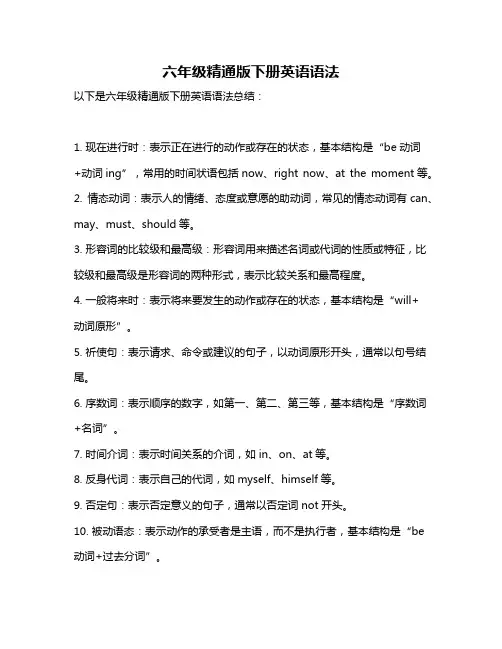
六年级精通版下册英语语法
以下是六年级精通版下册英语语法总结:
1. 现在进行时:表示正在进行的动作或存在的状态,基本结构是“be动词
+动词ing”,常用的时间状语包括now、right now、at the moment等。
2. 情态动词:表示人的情绪、态度或意愿的助动词,常见的情态动词有can、may、must、should等。
3. 形容词的比较级和最高级:形容词用来描述名词或代词的性质或特征,比较级和最高级是形容词的两种形式,表示比较关系和最高程度。
4. 一般将来时:表示将来要发生的动作或存在的状态,基本结构是“will+
动词原形”。
5. 祈使句:表示请求、命令或建议的句子,以动词原形开头,通常以句号结尾。
6. 序数词:表示顺序的数字,如第一、第二、第三等,基本结构是“序数词+名词”。
7. 时间介词:表示时间关系的介词,如in、on、at等。
8. 反身代词:表示自己的代词,如myself、himself等。
9. 否定句:表示否定意义的句子,通常以否定词not开头。
10. 被动语态:表示动作的承受者是主语,而不是执行者,基本结构是“be 动词+过去分词”。
以上是六年级精通版下册英语语法中的重点内容,掌握这些语法点有助于更好地理解和运用英语。
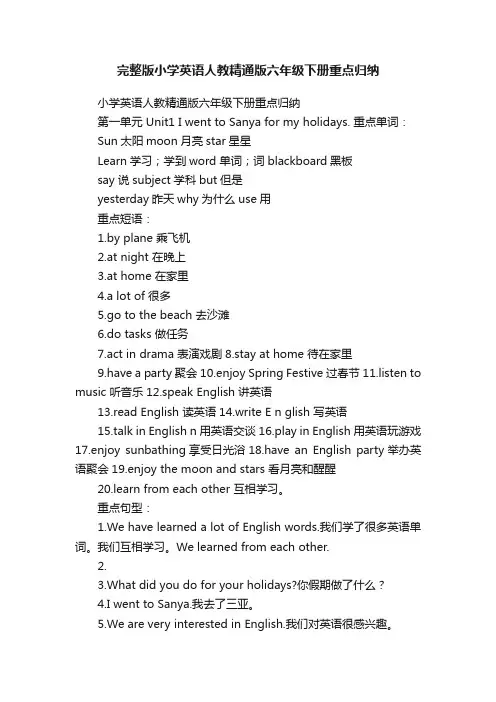
完整版小学英语人教精通版六年级下册重点归纳小学英语人教精通版六年级下册重点归纳第一单元 Unit1 I went to Sanya for my holidays. 重点单词:Sun太阳moon月亮star星星Learn学习;学到word 单词;词blackboard黑板say 说subject学科but但是yesterday昨天why为什么use用重点短语:1.by plane 乘飞机2.at night 在晚上3.at home 在家里4.a lot of 很多5.go to the beach 去沙滩6.do tasks 做任务7.act in drama 表演戏剧8.stay at home 待在家里9.have a party 聚会10.enjoy Spring Festive 过春节11.listen to music 听音乐12.speak English 讲英语13.read English 读英语14.write E n glish 写英语15.talk in English n用英语交谈16.play in English 用英语玩游戏17.enjoy sunbathing享受日光浴18.have an English party举办英语聚会19.enjoy the moon and stars 看月亮和醒醒20.learn from each other 互相学习。
重点句型:1.We have learned a lot of English words.我们学了很多英语单词。
我们互相学习。
We learned from each other.2.3.What did you do for your holidays?你假期做了什么?4.I went to Sanya.我去了三亚。
5.We are very interested in English.我们对英语很感兴趣。
6.How did you learn English?你(们)是怎么学英语的?7.We learned English by doing things.我们通过做事情来学英语。
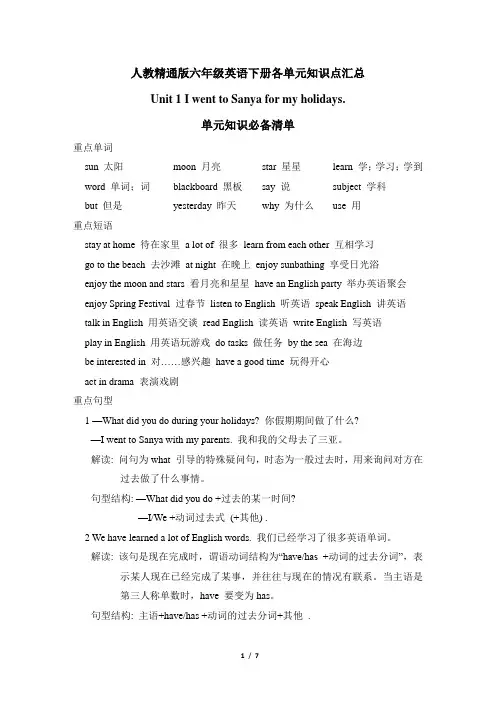
人教精通版六年级英语下册各单元知识点汇总Unit 1 I went to Sanya for my holidays.单元知识必备清单重点单词sun 太阳moon 月亮star 星星learn 学;学习;学到word 单词;词blackboard 黑板say 说subject 学科but 但是yesterday 昨天why 为什么use 用重点短语stay at home 待在家里a lot of 很多learn from each other 互相学习go to the beach 去沙滩at night 在晚上enjoy sunbathing 享受日光浴enjoy the moon and stars 看月亮和星星have an English party 举办英语聚会enjoy Spring Festival 过春节listen to English 听英语speak English 讲英语talk in English 用英语交谈read English 读英语write English 写英语play in English 用英语玩游戏do tasks 做任务by the sea 在海边be interested in 对……感兴趣have a good time 玩得开心act in drama 表演戏剧重点句型1 —What did you do during your holidays? 你假期期间做了什么?—I went to Sanya with my parents. 我和我的父母去了三亚。
解读: 问句为what 引导的特殊疑问句,时态为一般过去时,用来询问对方在过去做了什么事情。
句型结构: —What did you do +过去的某一时间?—I/We +动词过去式(+其他) .2 We have learned a lot of English words. 我们已经学习了很多英语单词。
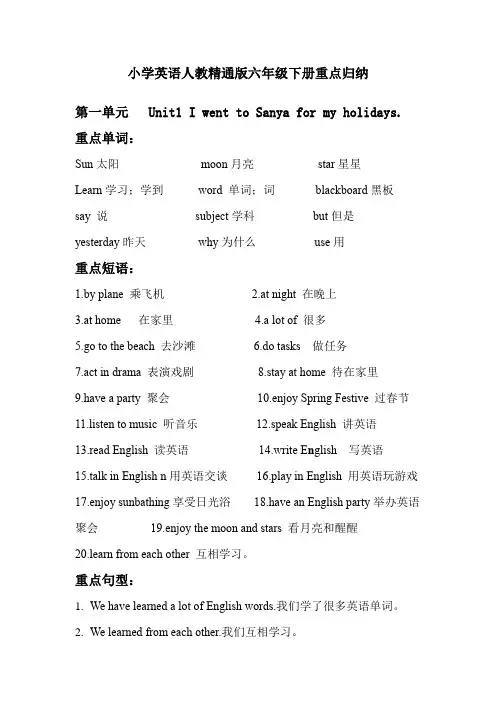
小学英语人教精通版六年级下册重点归纳第一单元 Unit1 I went to Sanya for my holidays. 重点单词:Sun太阳moon月亮star星星Learn学习;学到word 单词;词blackboard黑板say 说subject学科but但是yesterday昨天why为什么use用重点短语:1.by plane 乘飞机2.at night 在晚上3.at home 在家里4.a lot of 很多5.go to the beach 去沙滩6.do tasks 做任务7.act in drama 表演戏剧8.stay at home 待在家里9.have a party 聚会10.enjoy Spring Festive 过春节11.listen to music 听音乐12.speak English 讲英语13.read English 读英语14.write E n glish 写英语15.talk in English n用英语交谈16.play in English 用英语玩游戏17.enjoy sunbathing享受日光浴18.have an English party举办英语聚会19.enjoy the moon and stars 看月亮和醒醒20.learn from each other 互相学习。
重点句型:1.We have learned a lot of English words.我们学了很多英语单词。
2.We learned from each other.我们互相学习。
3.What did you do for your holidays?你假期做了什么?4.I went to Sanya.我去了三亚。
5.We are very interested in English.我们对英语很感兴趣。
6.How did you learn English?你(们)是怎么学英语的?7.We learned English by doing things.我们通过做事情来学英语。
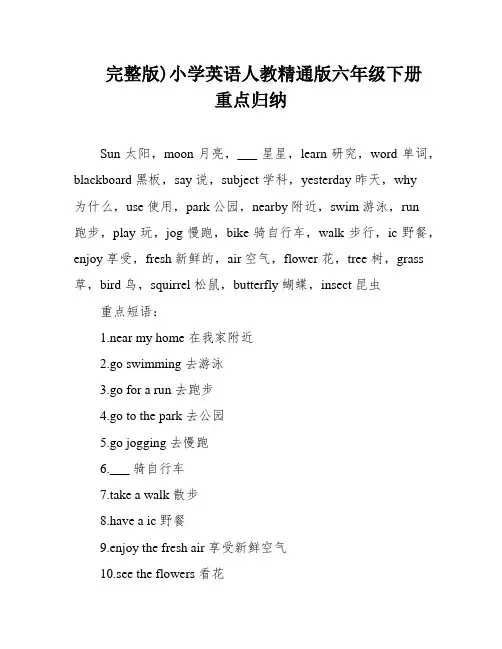
完整版)小学英语人教精通版六年级下册重点归纳Sun 太阳,moon 月亮,___ 星星,learn 研究,word 单词,blackboard 黑板,say 说,subject 学科,yesterday 昨天,why为什么,use 使用,park 公园,nearby 附近,swim 游泳,run跑步,play 玩,jog 慢跑,bike 骑自行车,walk 步行,ic 野餐,enjoy 享受,fresh 新鲜的,air 空气,flower 花,tree 树,grass 草,bird 鸟,squirrel 松鼠,butterfly 蝴蝶,insect 昆虫重点短语:1.near my home 在我家附近2.go swimming 去游泳3.go for a run 去跑步4.go to the park 去公园5.go jogging 去慢跑6.___ 骑自行车7.take a walk 散步8.have a ic 野餐9.enjoy the fresh air 享受新鲜空气10.see the flowers 看花11.climb the trees 爬树12.lie on the grass 躺在草地上13.watch the birds 看鸟14.feed the squirrels 喂松鼠15.chase the butterflies 追蝴蝶16.catch the insects 捉昆虫重点句型:1.There is a park near my home。
我家附近有个公园。
2.I like to go swimming in the summer。
我喜欢在夏天去游泳。
3.We can go for a run in the morning。
我们可以在早上去跑步。
4.Let's go to the park and play。
让我们去公园玩吧。
5.___我喜欢在公园里慢跑。
6.I often ___ 我经常骑自行车去公园。
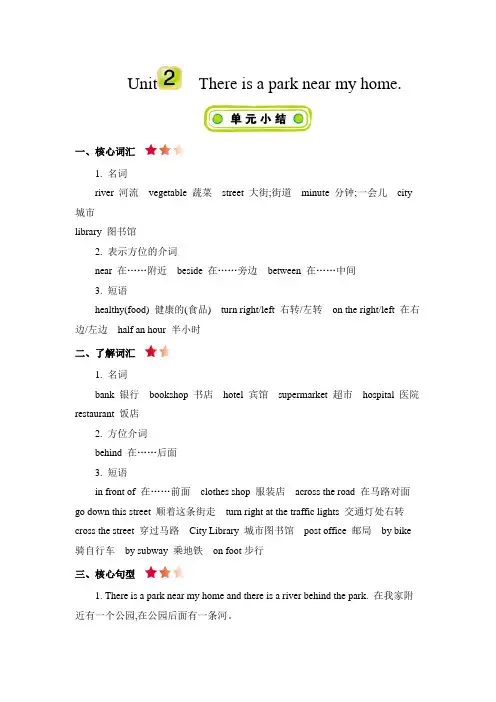
Unit There is a park near my home.一、核心词汇1. 名词river 河流vegetable 蔬菜street 大街;街道minute 分钟;一会儿city 城市library 图书馆2. 表示方位的介词near 在……附近beside 在……旁边between 在……中间3. 短语healthy(food) 健康的(食品)turn right/left 右转/左转on the right/left 在右边/左边half an hour 半小时二、了解词汇1. 名词bank 银行bookshop 书店hotel 宾馆supermarket 超市hospital 医院restaurant 饭店2. 方位介词behind 在……后面3. 短语in front of 在……前面clothes shop 服装店across the road 在马路对面go down this street 顺着这条街走turn right at the traffic lights 交通灯处右转cross the street 穿过马路City Library 城市图书馆post office 邮局by bike 骑自行车by subway 乘地铁on foot步行三、核心句型1. There is a park near my home and there is a river behind the park. 在我家附近有一个公园,在公园后面有一条河。
解读:这是there be句型的固定结构。
句型结构为There be + 名词+ 介词+ 名词.举一反三: There is a bank behind my home. 在我家后面有一个银行。
There are some books on the desk. 桌子上有一些书。
2. There are a lot of trees and flowers in the park. 在公园里有许多树和鲜花。
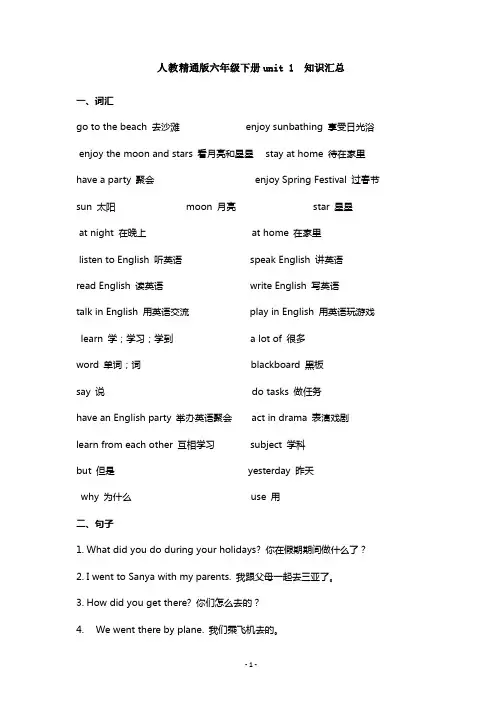
人教精通版六年级下册unit 1 知识汇总一、词汇go to the beach 去沙滩enjoy sunbathing 享受日光浴 enjoy the moon and stars 看月亮和星星stay at home 待在家里have a party 聚会 enjoy Spring Festival 过春节sun 太阳 moon 月亮star 星星at night 在晚上at home 在家里listen to English 听英语speak English 讲英语read English 读英语write English 写英语talk in English 用英语交流play in English 用英语玩游戏learn 学;学习;学到 a lot of 很多word 单词;词blackboard 黑板say 说do tasks 做任务have an English party 举办英语聚会 act in drama 表演戏剧learn from each other 互相学习subject 学科but 但是 yesterday 昨天why 为什么use 用二、句子1.What did you do during your holidays? 你在假期期间做什么了?2.I went to Sanya with my parents. 我跟父母一起去三亚了。
3.How did you get there? 你们怎么去的?4.We went there by plane. 我们乘飞机去的。
5. Did you have a good time? 你玩得开心吗?6.We enjoyed sunbathing during the day, and we enjoyed the moon and stars at night. 我们白天享受日光浴,晚上欣赏月亮和星星。
7.We are very interested in English. 我们对英语很感兴趣。
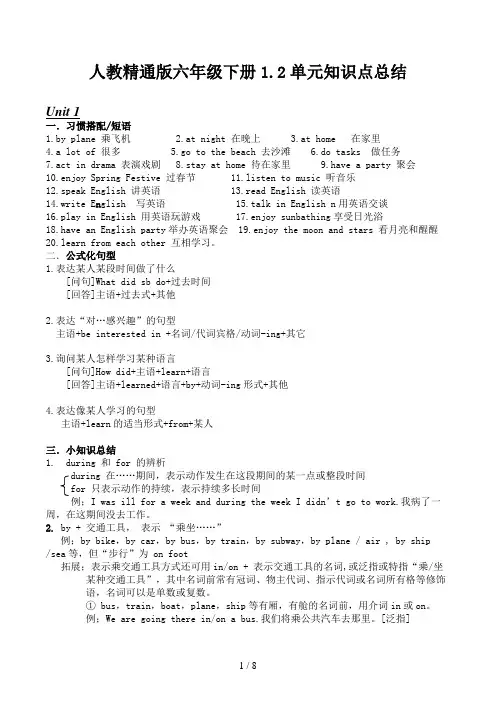
人教精通版六年级下册1.2单元知识点总结Unit 1一.习惯搭配/短语1.by plane 乘飞机2.at night 在晚上3.at home 在家里4.a lot of 很多5.go to the beach 去沙滩6.do tasks 做任务7.act in drama 表演戏剧 8.stay at home 待在家里 9.have a party 聚会10.enjoy Spring Festive 过春节 11.listen to music 听音乐12.speak English 讲英语 13.read English 读英语14.write E n glish 写英语 15.talk in English n用英语交谈16.play in English 用英语玩游戏 17.enjoy sunbathing享受日光浴18.have an English party举办英语聚会 19.enjoy the moon and stars 看月亮和醒醒20.learn from each other 互相学习。
二.公式化句型1.表达某人某段时间做了什么[问句]What did sb do+过去时间[回答]主语+过去式+其他2.表达“对…感兴趣”的句型主语+be interested in +名词/代词宾格/动词-ing+其它3.询问某人怎样学习某种语言[问句]How did+主语+learn+语言[回答]主语+learned+语言+by+动词-ing形式+其他4.表达像某人学习的句型主语+learn的适当形式+from+某人三.小知识总结1. during 和 for 的辨析during 在……期间,表示动作发生在这段期间的某一点或整段时间for 只表示动作的持续,表示持续多长时间例;I was ill for a week and during the week I didn’t go to work.我病了一周,在这期间没去工作。
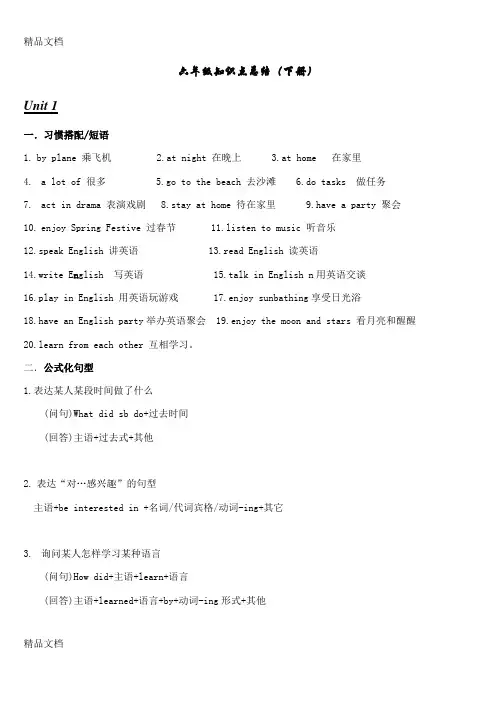
六年级知识点总结(下册)Unit 1一.习惯搭配/短语1.by plane 乘飞机2.at night 在晚上3.at home 在家里4. a lot of 很多5.go to the beach 去沙滩6.do tasks 做任务7.act in drama 表演戏剧 8.stay at home 待在家里 9.have a party 聚会10.enjoy Spring Festive 过春节 11.listen to music 听音乐12.speak English 讲英语 13.read English 读英语14.write E n glish 写英语 15.talk in English n用英语交谈16.play in English 用英语玩游戏 17.enjoy sunbathing享受日光浴18.have an English party举办英语聚会 19.enjoy the moon and stars 看月亮和醒醒20.learn from each other 互相学习。
二.公式化句型1.表达某人某段时间做了什么(问句)What did sb do+过去时间(回答)主语+过去式+其他2.表达“对…感兴趣”的句型主语+be interested in +名词/代词宾格/动词-ing+其它3.询问某人怎样学习某种语言(问句)How did+主语+learn+语言(回答)主语+learned+语言+by+动词-ing形式+其他4.表达像某人学习的句型主语+learn的适当形式+from+某人三.小知识总结1. during 和 for 的辨析during 在……期间,表示动作发生在这段期间的某一点或整段时间for 只表示动作的持续,表示持续多长时间例:I was ill for a week and during the week I didn’t go to work.我病了一周,在这期间没去工作。
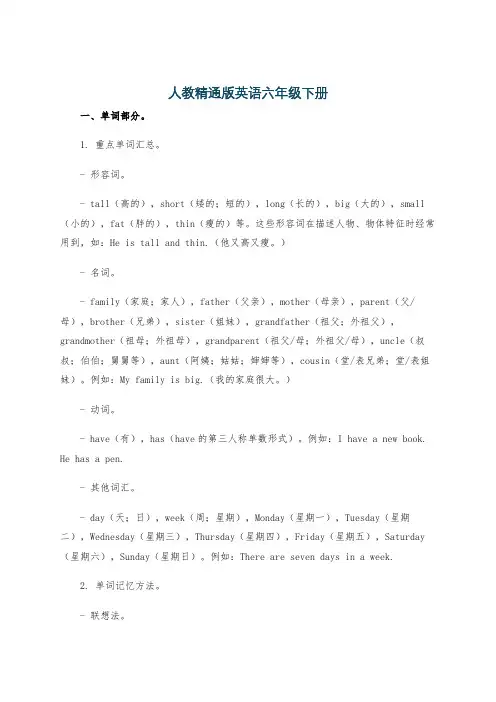
人教精通版英语六年级下册一、单词部分。
1. 重点单词汇总。
- 形容词。
- tall(高的),short(矮的;短的),long(长的),big(大的),small (小的),fat(胖的),thin(瘦的)等。
这些形容词在描述人物、物体特征时经常用到,如:He is tall and thin.(他又高又瘦。
)- 名词。
- family(家庭;家人),father(父亲),mother(母亲),parent(父/母),brother(兄弟),sister(姐妹),grandfather(祖父;外祖父),grandmother(祖母;外祖母),grandparent(祖父/母;外祖父/母),uncle(叔叔;伯伯;舅舅等),aunt(阿姨;姑姑;婶婶等),cousin(堂/表兄弟;堂/表姐妹)。
例如:My family is big.(我的家庭很大。
)- 动词。
- have(有),has(have的第三人称单数形式)。
例如:I have a new book. He has a pen.- 其他词汇。
- day(天;日),week(周;星期),Monday(星期一),Tuesday(星期二),Wednesday(星期三),Thursday(星期四),Friday(星期五),Saturday (星期六),Sunday(星期日)。
例如:There are seven days in a week.2. 单词记忆方法。
- 联想法。
- 对于“family”这个单词,可以联想为“father and mother I love you”每个单词的首字母组成了“family”,这样就很容易记住它的拼写和含义。
- 对比记忆法。
- 像“tall”和“short”,“big”和“small”这样的反义词,可以成对记忆。
通过对比它们的含义和用法,加深对单词的理解。
例如,看到“tall”就想到它的反义词“short”,可以说“A giraffe is tall, but a rabbit is short.”二、句型部分。
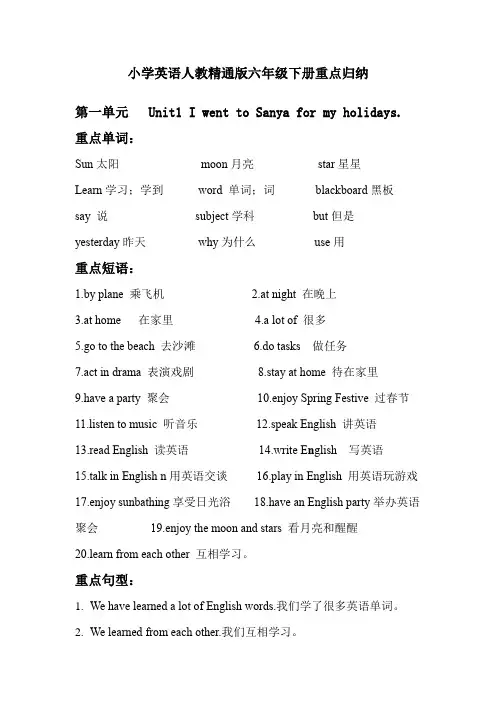
小学英语人教精通版六年级下册重点归纳第一单元 Unit1 I went to Sanya for my holidays. 重点单词:Sun太阳moon月亮star星星Learn学习;学到word 单词;词blackboard黑板say 说subject学科but但是yesterday昨天why为什么use用重点短语:1.by plane 乘飞机2.at night 在晚上3.at home 在家里4.a lot of 很多5.go to the beach 去沙滩6.do tasks 做任务7.act in drama 表演戏剧8.stay at home 待在家里9.have a party 聚会10.enjoy Spring Festive 过春节11.listen to music 听音乐12.speak English 讲英语13.read English 读英语14.write E n glish 写英语15.talk in English n用英语交谈16.play in English 用英语玩游戏17.enjoy sunbathing享受日光浴18.have an English party举办英语聚会19.enjoy the moon and stars 看月亮和醒醒20.learn from each other 互相学习。
重点句型:1.We have learned a lot of English words.我们学了很多英语单词。
2.We learned from each other.我们互相学习。
3.What did you do for your holidays?你假期做了什么?4.I went to Sanya.我去了三亚。
5.We are very interested in English.我们对英语很感兴趣。
6.How did you learn English?你(们)是怎么学英语的?7.We learned English by doing things.我们通过做事情来学英语。
Unit I went to Sanya for my holidays.一、核心词汇1.名词sun太阳moon月亮star星星blackboard黑板subject学科word 单词;词lesson课yesterday昨天2.动词learn学习say说use用3.其他but但是why为什么4.短语by plane乘飞机at night晚上at home在家里a lot of很多二、了解词汇短语go to the beach去沙滩enjoy sunbathing享受日光浴enjoy the moon and stars看月亮和星星stay at home待在家里have a party聚会enjoy Spring Festival过春节listen to English听英语speak English讲英语read English 读英语write English写英语talk in English用英语交谈play in English用英语玩游戏do tasks做任务have an English party举办英语聚会act in drama表演戏剧learn from each other互相学习三、核心句型1.—What did you do during your holidays?假期你做了什么?—I went to Sanya with my parents.我和我的父母一起去了三亚。
解读:这是一般过去时的特殊疑问句。
举一反三:—What did you do yesterday?昨天你做了什么?—I went to the hospital.我去医院了。
2.—How did you get there?你怎样到的那里?—We went there by plane.我们乘飞机去的。
解读:how的意思是“怎样”,可以提问交通方式或做某件事的方法等。
举一反三:—How did you go to school?你怎样去上学?—I went to school on foot.我步行去学校。
精通英语六年级下册知识点六年级英语下册是学习英语的重要阶段,其中包含了许多重要的知识点。
在这篇文章中,我们将全面介绍并总结六年级英语下册的知识点。
一、词汇与拼写六年级英语下册,词汇量较大,需要学生掌握大量的单词和词组,并且学会正确拼写它们。
以下是一些常见的词汇和拼写知识点:1. 动词的时态变化:学生需要掌握各种时态的动词形式,如一般现在时、一般过去时、将来时等。
2. 名词的单复数形式:学生需要学会将常见名词从单数形式转化为复数形式,并掌握一些特殊名词的复数形式规则。
3. 同音词和近义词:学生需要辨析一些同音词和近义词,以避免在使用时出现语义错误。
二、语法知识六年级英语下册重点学习了一些复杂的语法知识,以下是一些重要的语法知识点:1. 时态和语态:学生需要掌握各种时态的用法,并熟练运用被动语态。
2. 直接引语和间接引语:学生需要学会将直接引语转化为间接引语,并注意引号的使用和词语顺序的改变。
3. 比较级和最高级:学生需要学会比较级和最高级的构成以及用法,并能在实际交流中恰当运用。
三、阅读理解在六年级英语下册中,阅读理解是一个非常重要的部分。
以下是一些阅读理解的重要知识点:1. 阅读短文并回答问题:学生需要学会通过阅读短文来获取信息,并根据问题作出准确的回答。
2. 根据上下文猜测词义:学生需要通过上下文的提示来猜测生词的含义,并理解整篇文章的意思。
3. 阅读图表和图画:学生需要学会读懂图表和图画,并从中获取相关信息。
四、写作技巧写作是六年级英语下册中的一个重要方面。
以下是一些写作技巧的知识点:1. 写作结构:学生需要学会使用适当的写作结构来组织自己的文章,包括引言、主体和结论部分。
2. 描述和叙述:学生需要掌握一些描述和叙述的常用句型和词汇,以便清楚地表达自己的观点和意见。
3. 书信和日记:学生需要学会写书信和日记,并熟悉一些日常用语和格式。
总结:通过学习六年级英语下册的知识点,学生可以提升自己的英语能力,更好地理解和运用英语。
⼩学英语⼈教精通版六年级下册重点归纳⼩学英语⼈教精通版六年级下册重点归纳第⼀单元 Unit1 I went to Sanya for my holidays、重点单词:Sun太阳moon⽉亮star星星Learn学习;学到word 单词;词blackboard⿊板say 说subject学科but但就是yesterday昨天why为什么use⽤重点短语:1、by plane 乘飞机2、at night 在晚上3、at home 在家⾥4、a lot of 很多5、go to the beach 去沙滩6、do tasks 做任务7、act in drama 表演戏剧8、stay at home 待在家⾥9、have a party 聚会10、enjoy Spring Festive 过春节11、listen to music 听⾳乐12、speak English 讲英语13、read English 读英语14、write E n glish 写英语15、talk in English n⽤英语交谈16、play in English ⽤英语玩游戏17、enjoy sunbathing享受⽇光浴18、have an English party举办英语聚会19、enjoy the moon and stars 瞧⽉亮与醒醒20、learn from each other 互相学习。
重点句型:1.We have learned a lot of English words、我们学了很多英语单词。
2.We learned from each other、我们互相学习。
3.What did you do for your holidays?您假期做了什么?4.I went to Sanya、我去了三亚。
5.We are very interested in English、我们对英语很感兴趣。
6.How did you learn English?您(们)就是怎么学英语的?7.We learned English by doing things、我们通过做事情来学英语。
六年级知识点总结(下册)Unit 21. in front of 在物体外部的前面例:There are some trees in front of the building.反义词behind在这个楼前有一些树。
in the front of在物体内部的前面例:There is a desk in the front of the classroom.反义词behind 或at the back of在教室的前部有一张书桌。
2.next to 靠近,几乎例:She sat next to her mother. 她坐在她妈妈的旁边。
It’s next to impossible to win the game. 要赢那场比赛几乎不可能。
3.cross,across 和through(都有穿越,穿过的意思,用法不同)① cross 是动词例:I want to cross that street soon. 我想迅速穿过那条大街。
② across 是副词,指从一个平面的一端到另一端,如:海的一端到另一端,across the ocean,③ through是副词,强调在三维立体的内部穿过.还有抽象的意义,如度过了某段时间等。
如:through the tunnel 穿过隧道4.问路的几个表达方法①How can I get to the + 你想去的地点②Where is the + 你想去的地点③Can you tell me the way to the+ 你想去的地点5.巧记时间名词前的介词的用法年月周前要用in,日子前面却不行。
遇到几号要用on,上午下午又是in。
要说某日上下午,用on 换in才能行。
正午夜晚用at,黎明用它也不错。
at也在钟点前,说“差”用to,past表示“过”。
6.巧记地点名词前介词的用法:里面、上面in和on,over,under上下方,in front of前,behind后,at是在某点上。
精通英语六年级下知识点六年级下英语知识点:精通英语一、单词拼写1. celebration (庆祝)The whole school gathered in the playground for the New Year celebration.2. adventure (冒险)The children went on an exciting adventure in the deep forest.3. instrument (乐器)Tom plays the piano and his sister plays the violin. They both love musical instruments.4. geography (地理)In geography class, we learn about different countries and their landscapes.5. community (社区)We should work together to build a harmonious community.二、语法规则1. 一般现在时We use the simple present tense to talk about something that happens regularly or is a fact. For example:- My brother always plays basketball on Sundays.- Water boils at 100 degrees Celsius.2. 一般过去时We use the simple past tense to talk about something that happened in the past. For example:- Yesterday, I went to the park with my friends.- Last summer, we traveled to Japan.3. 现在进行时We use the present continuous tense to talk about an action happening now or in the near future. For example:- She is reading a book at the moment.- They are going to the beach tomorrow.4. 名词单复数In English, most nouns form their plural by adding "s" to the end of the word. For example:- One book, two books- A cat, three cats5. 形容词比较级和最高级We use comparative and superlative forms of adjectives to compare or describe things. For example:- This book is more interesting than that one.- The blue bird is the most beautiful bird in the world.三、阅读理解1. 阅读短文,选择正确答案Read the following passage and choose the correct answer:Yesterday was my birthday. My parents bought me a beautiful gift. It's a new bicycle! I was so excited. In the afternoon, I rode my bicycle to the park with my friends. We had a lot of fun playing games and having a picnic. It was a perfect birthday.- What did the parents buy for the writer?- A. A new book- B. A new bicycle- C. A new toyAnswer: B. A new bicycle2. 阅读短文,回答问题Read the following passage and answer the questions:Sarah is a student from England. She is in Grade 6. She can speak English and French very well. She loves playing the piano and oftenplays for her classmates during school events. Sarah also enjoys reading books and playing basketball. Her dream is to become a famous pianist one day.- Where is Sarah from?- What languages can she speak?- What does Sarah enjoy doing besides playing the piano?- What is Sarah's dream?Answer:- Sarah is from England.- She can speak both English and French.- Sarah enjoys reading books and playing basketball.- Her dream is to become a famous pianist.四、写作技巧1. 写人物介绍When writing about a person, it's important to mention their name, age, hobbies, and dreams. Use adjectives to describe the person's personality and appearance. For example:My best friend, Lisa, is a cheerful and kind-hearted girl. She is twelve years old and has long, curly hair. Lisa loves playing the guitar and dreams of becoming a famous singer one day.2. 描述地点When describing a place, start with an introductory sentence and then provide more details about the location, its features, and what activities are available there. For example:The beach is a beautiful and relaxing place. It is located by the seaside and has soft, golden sand. People can swim, sunbathe, and build sandcastles at the beach. The sound of the waves and the fresh sea breeze create a peaceful atmosphere.以上是六年级下英语知识点的简要介绍。
人教精通版英语六年级下册知识点汇总
人教精通版六年级下册unit 1 知识汇总
一、词汇
go to the beach 去沙滩
enjoy sunbathing 享受日光浴
enjoy the moon and stars 看月亮和星星
stay at home 待在家里
have a party 聚会
enjoy Spring Festival 过春节
sun 太阳
moon 月亮
star 星星
at night 在晚上
at home 在家里
listen to English 听英语
speak English 讲英语
read English 读英语
write English 写英语
talk in English 用英语交流
play in English 用英语玩游戏
learn 学;学习;学到
a lot of 很多
word 单词;词
blackboard 黑板
say 说
do tasks 做任务
have an English party 举办英语聚会
act in drama 表演戏剧
learn from each other 互相学习
subject 学科
but 但是
yesterday 昨天
why 为什么
use 用
二、句子
1. What did you do during your holidays? 你在假期期间做什么了?
2. I went to Sanya with my parents. 我跟父母一起去三亚了。
3. How did you get there? 你们怎么去的?
4. We went there by plane. 我们乘飞机去的。
5. Did you have a good time? 你玩得开心吗?
6. We enjoyed sunbathing during the day, and we enjoyed the moon and stars at night. 我们白天享受日光浴,晚上欣赏月亮和星星。
7. We are very interested in English. 我们对英语很感兴趣。
8. We have learned a lot of English words. 我们已经学习了很多英语单词。
9. How did you learn English? 你怎么学习英语的?
10. We learned English by doing things. 我们通过做事情学习英语。
11. We learned from each other. 我们互相学习。
三、句型结构
1. —What did you do + 过去时间? 介绍地点的句型。
—I/ We + 动词过去式(+其他).
eg: —What did you do last Sunday? 你上周干嘛了?
—I went to visit my grandparents.
2. 主语+ be (am, is, are) interested in + 名词/ 代词宾格/ 动词-ing 形式(+其他). 表示某人对某事很感兴趣。
eg:I am very interested in maths. 我对数学很感兴趣。
3. 主语+ have/ has + 动词的过去分词+ 其他. 表达某人已经做过某事。
eg:We have visited a lot of places in China. 我们已经游览过中国的很多地方。
3. How did you learn + 语言? 询问某人学习某种语言的方式。
eg: —How did you learn Chinese? 你怎么学习中文的?
—I learned Chinese by talking with my Chinese friends. 我通过跟我的中国朋友交流学习中文。
4. 主语+ learn/ learns/ learned from + 某人. 表示向某人学习。
Eg: I learned a lot from my parents. 我从父母那里学到了很多。
人教精通版下册六年级unit 2 知识汇总
12. Where are you going? 你要去哪?
三、句型结构
1. —Where is + 地点? 询问地点的句型。
—Go down + 街道/ 马路.
eg: —Where is the supermarket? 超市在哪?
—Go down the street.
2. How can + 主语+ get (to) + 地点? 询问如何到达某地。
eg:—How can I get to the library? 我怎么到达图书馆?—You can get there on foot. 你可以步行过去。
3. There is/ are + 某人/ 某物+ 地点. 表达某处有某物。
eg:There is a river in front of my house. 我家门前有一条河。
人教精通版下册六年级unit 3 知识汇总
一、词汇
Shanghai 上海
Xi’an 西安
Wuhan 武汉
by plane 乘飞机
by train 乘火车
by ship 乘轮船
travel 旅行
know 知道
hear 听见
lake 湖;湖泊
the Ming Tombs 明十三陵
the Temple of Heaven 天坛
the Summer Palace 颐和园
the Forbidden City 紫禁城
Beihai Park 北海公园
tomorrow 明天
visit 参观
the Great Wall 长城
them 他们;她们;它们(they的宾格)
Tower Bridge 伦敦塔桥
Big Ben 大本钟
Niagara Falls 尼亚加拉瀑布
CN Tower 加拿大国家电视塔
Sydney Opera House 悉尼歌剧院
Disneyland 迪士尼乐园
see 看见
favourite 最喜欢的
place 位置;地点
二、句子
1. This is my family’s travel plan. 这是我家人的旅行计划。
2. We are going to travel around China during the summer holidays. 我们打算在暑假期间环游中国。
3. We are going to Hangzhou by plane. 我们打算乘飞机去杭州。
4. We are going to visit the West Lake there. 我们打算去游览西湖。
5. It’s the longest wall in the world. 它是世界上最长的一道墙。
6. Can you tell me something more about Harbin, Xi’an, Sanya and other places? 你能告诉我更多关于哈尔滨,西安,三亚和其他地方的事情吗?
7. Where are we going today? 我们今天要去哪里?
9. Is the Great Wall far from here? 长城离这儿远吗?
10. It’s in the north of Beijing. 它在北京的北部。
11. When are we going to the Summer Palace? 我们什么时候去颐和园?
12. We can learn a lot about the history of China. 关于中国历史我们可以学习很多。
13. Would you like to go to the Disneyland? 你想去迪士尼乐园吗?
14. I want to see all my favourite places. 我想去游览所有我最喜欢的地方。
三、句型结构
1. 主语+ be going to + 动词原形+ 其他. 表达某人打算做某事。
eg: We are going to go shopping. 我们打算去购物。
2. When are we going to + 动词原形(其他)? 询问我们打算什么时间去做某事。
eg:—When are we going to visit the West Lake? 我们打算什么时间游览西湖?—Next Friday. 下周五。
3. Would you like to + 动词原形(+ 其他)? 询问对方是否想做某事?
eg:
—Would you like to go to the party? 你想去那个聚会吗?
—Yes, of course. 是的,当然。